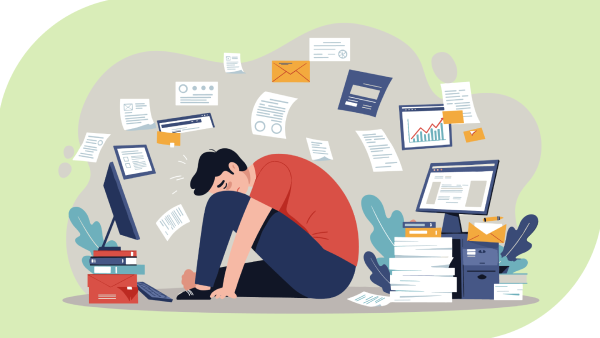COMBAT STRESS

Lessons from a Zen Monk About Avoiding Burnout
By Liz Bernhard, CFP®
Chan Phap Huu is a Zen monk who has been training in the Plum Village tradition since the age of 13. On a recent episode of the 10% Happier podcast, Brother Phap Huu shared that even after 20 years of a monastic life, he is still susceptible to feelings of busyness, overwhelm, and burnout. If a Zen monk can struggle with these issues, is there any hope for the rest of us?
The answer is yes.
Brother Phap Huu shared three lessons we can all internalize—regardless of how strong (or nonexistent) our meditation practice may be.
Acknowledge the Stress
This may seem simple, but it’s surprisingly difficult. We often hear (or say), “I’m so busy,” or “My schedule is crazy.” Yet truly recognizing the stress—both physical and emotional—that stems from the demands of our lives isn’t always easy or immediate. Have you ever wondered why your shoulders are tight, your energy is low, or your patience is thin? Stress is often the hidden culprit.
For me, the sense of overwhelm stems from a couple of recurring themes, most notably, saying “yes” when I need to say “no.” I think I can do more in a day, a week, or a month than I realistically can while keeping my sanity. More isn’t always more. Sometimes more is less. Figuring out your limit—when “doing” shifts from a sense of accomplishment to a sense of overwhelm—is essential.
We tend to equate busyness with self-worth. The more we do, the more valuable we feel. In a world where many of us quietly fear we’re not enough, admitting that our commitments are overwhelming can feel like admitting failure. But if we can’t acknowledge our feelings of stress, we won’t be able to change them.
Identify the Root Causes
What is actually driving your sense of overwhelm? Is it work? Something in your personal life? Can you pinpoint the specific sources of stress? Sometimes simply identifying the causes can be healing in and of itself. The root can be buried deep, and unearthing it might not be a solo task. We often avoid the things we need to look at the most.
Once you understand what’s behind your busyness, you can make an intentional choice: embrace it as part of your current season of life or take action to change what’s unsustainable. Either path is valid; what matters is moving forward with awareness, not on autopilot.
Public speaking is a source of stress for me, as it is for many of us. Whenever I have a public speaking engagement, I feel my stress building in the days leading to the event. For me, this is a fear manifesting stress, and it is rooted in insecurity. What if I stumble over my words, come across as unprepared, or worse yet—totally freeze! Recognizing this root doesn’t eliminate my fear, but it does make me more aware when I feel the stress building. I know what is driving it, which helps me deal with it better and channel my energy productively, rather than letting stress spill over in ways that are unhealthy for me and off-putting to others.
Take Refuge in Something Other Than Doing
This step is the hardest for me. As the Zen saying goes, “Don’t just do something, sit there.”
Whether it’s rest, a walk in nature, or a meaningful connection with a friend, taking time to recharge is essential to wellness. Give yourself permission to pause. Often, it’s in those moments of rest that we gain the clarity necessary to move forward with renewed purpose and strength.
Be mindful of turning self-care into a chore or need for achievement. It is easy to “should” ourselves when it comes to health and wellness. Spend any amount of time on social media, and you’ll come away with the notion that you should be exercising for hours a day, eating perfectly, spending time outdoors, taking cold showers, getting in the sauna five times a week, and definitely meditating. Kudos to you if you can fit that all into your schedule. I can’t. So I prioritize the things that make me feel good and accept that doing more would be too much for me.
The Takeaway: Find What Works for You to De-stress
We don’t have to follow traditional meditation practice to connect with ourselves. I’m inspired by a fellow NAPFA member who schedules quarterly downtime. She checks into a hotel to get away from the demands of both home and work life and spends two days resting and reflecting on the alignment of her effort—her “doing”—with her identified goals. This allows her to stay true to her purpose and keep showing up for herself and those around her authentically and effectively.
Brother Phap Huu found that by acknowledging his stress, identifying its roots, and prioritizing rest and reflection, he was able to regain the joy of service—a central tenet of monastic life.
Many NAPFA members enter the Fee-Only financial planning industry because of a similar joy: serving clients with independent, unbiased advice that is truly in their best interest.
Let’s not lose our joy of service to burnout and overwhelm. Let’s take a page from the Zen monk playbook and help ourselves by acknowledging and accepting our stressors and taking the time to rest so we can show up for our clients and, most importantly, ourselves, feeling present and purposeful.
Liz Bernhard is president of Albion Financial Group, a Fee-Only RIA in Salt Lake City. She spends her time ensuring Albion’s success in exceeding client expectations, growing the firm, and fostering an exceptional workplace for the team.
image credit: Adobe Stock Images